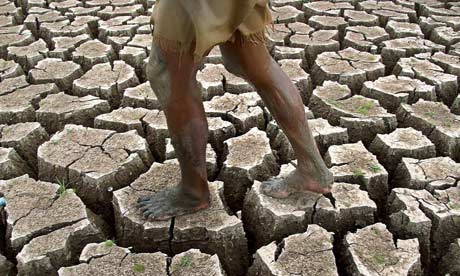Online news service promotes false [incorrect] climate change study
EurekAlert! carried a study with unfounded global warming claims that the planet would warm by 2.4 °C by 2020

An online news service sponsored by the world's premier scientific association unwittingly promoted [huh?] a study making the false claim that catastrophic global warming would occur within nine years, The Guardian has learned.
The study, by an NGO based in Argentina, claimed the planet would warm by 2.4 °C by 2020 and projected dire consequences for global food supply. A press release for the Food Gap study was carried by EurekAlert!, the news service operated by the American Association for the Advancement of Science (AAAS) , and the story was picked up by a number of international news organisations on Tuesday.
"This is happening much faster than we expected," Liliana Hisas, executive director of the Universal Ecological Fund (UEF) and author of the study, said of her findings.
But, in an episode recalling criticism of the Intergovernmental Panel on Climate Change (IPCC), when the UN climate science body wrongly claimed the Himalayan glaciers would melt away by 2035• , the UEF claims about rising temperatures over the next decade were unfounded.
Climate change is happening much faster than previously thought. But warming at such a rapid rate over the next decade is impossible, climate scientists said.
In an email, Gavin Schmidt, a NASA climatologist, wrote: "2.4 °C by 2020 (which is 1.4 °C in the next 10 years – something like six to seven times the projected rate of warming) has no basis in fact."
The AAAS, which runs the EurekAlert! News service, removed reference to the study from its website on Tuesday afternoon.
"We primarily rely on the submitting organisation to ensure the veracity of the scientific content of the news release," Ginger Pinholster, director of the office of public programmes for AAAS said.
"In this case, we immediately contacted a climate-change expert after receiving your query. That expert has confirmed for us that the information indeed raises many questions in his mind, and therefore we have removed the news release from EurekAlert!"
But by then the study had been picked up by a number of international news organisations including the French news agency AFP, Spain's EFE news agency, the Canadian CTV television network and the Vancouver Sun, and the Press Trust of India.
For some climate scientists, the false claims made by the UEF paper recalled the highly damaging episode in which the IPCC, the UN's climate science body, included the false information about melting of the Himalayan glaciers in its 2007 report.
The mistake was a public relations disaster for the IPCC and led to calls for the resignation of its chair, Rajendra Pachauri.
It was also exploited by climate sceptics to undermine the science of climate change, and is seen by some as having set back efforts in the US for action on climate change.
In this instance, climate scientists said it appeared Hisas had overlooked the influence exerted by the oceans, which absorb heat, thus delaying the effects of increasing concentrations of greenhouse gas emissions in the atmosphere.
Ray Weymann, a founder of a volunteer rapid-response force aimed at countering misconceptions about climate science, said: "The author has a fundamental misunderstanding."
Hisas, for her part, said her findings had been endorsed by an Argentine scientist, Osvaldo Canziani, who had worked on the IPCC's fourth assessment report on the state of climate science, and was credited as an adviser to the UEF.
Hisas's main finding, that climate change would disrupt the supply of basic staples such as wheat and rice, was largely in line with other recent reports.
She said the UEF did not intend to withdraw the report. "We are just going to go ahead with it. I don't have a choice now," she said. "The scientist I have been working with checked everything and according to him it's not wrong."
Marshall Hoffman, owner of the PR agency which placed the notice on the AAAS website, argued that a number of recent studies had all shown warming at a much faster rate than predicted by the IPCC in its most recent report. "The thing is, we have already put it on the internet and we had already got a lot of calls on it," he said. "This study is going to be bantered around for months. It doesn't make any difference whether it is released now, or we try to pull it back."
Canziani did not immediately respond to email. Hisas and sources in Buenos Aires said he was ill.
Canziani was co-chair of the IPCC's working group 2, which looked at the effects of climate change. The erroneous claim on Himalayan glaciers in the 2007 report was in the section overseen by working group 2. [is The Guardian trying to smear working group 2?]







No comments:
Post a Comment